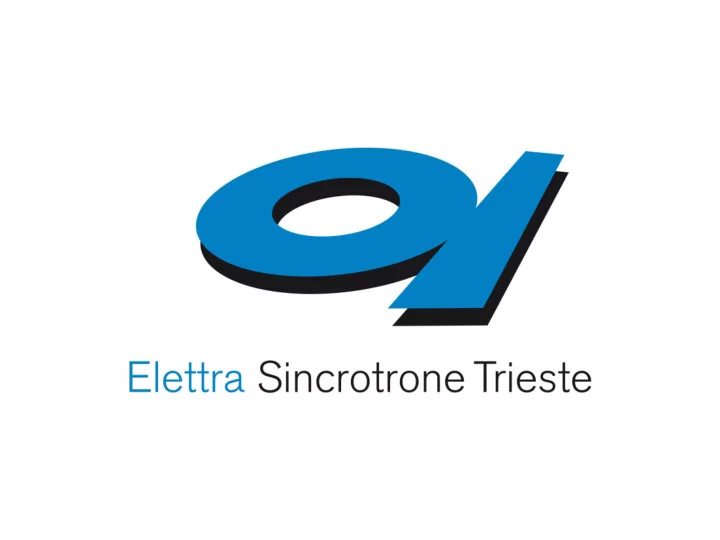

UHV experiments Luca Gregoratti Coordinators of the Microscopy/Diffraction Beamlines Groups 2
Outline • The surface science case in research (e.g. catalysis, interfaces, sensors). • Photoemission spectroscopy and microscopy. • Instrumentation requirements. • Examples and technologies for the future
Quantitative analysis Rh RhO 2 Fine Rh 2 O 3 Chemical analysis Surf
Escamicroscopy - SPEM layout Milestones • 1995:first user • 2000-2004: new micros/prep chambers • Linearly Polarised Undulator • Photon energy range: 350 – 1200 eV • SGM monochromator equipped with 2 gratings for low and high photon energy
Spatial resolution Best ZP: D=200 m m, dr=50 nm Zone plate used: Other sizes: D=250 m m, dr=100nm D=250 m m, dr=80nm Spectromicroscopy: real beam size and shape 135 nm (SPEM) Imaging: effectice resolution 50 nm test object < 50 nm (SPEM) Horizontal scan
Chemical imaging 6 m m • Chemical inhomogeneity Image on Ni Ni islands on Si Ni island Si substrate Image on Si Au patch on Rh(110) Image on Rh Au Rh(110) Image on Au
Degradation of light emitting diodes (in collaboration with P. Melpignano CRP, R. Zamboni CNR-ISMN) “Clean” experiment: OLED OLED exposed to growth and operated in the atmospheric moisture: SPEM (UHV ambient) : failure failure due to light emission due to light emission 64 m m • Decomposition Al of ITO In3d5/2 Pristine ITO 64 m m PE Intensity (arb. units) In Al = metallic indium! Cathode near hole Dark spot in OLED In -448 -446 -444 -442 Al2p Binding Energy (eV) Al In increasing voltage and operating time P. Melpignano et al. Appl. Phys. Lett. 86, 041105 (2005), S. Gardonio et al. Org. Electr. 8 (1), 37-43, (2007)
Operating SOFC: mass transport (in collaboration with M. Backhaus- Corning Inc. - USA) Elemental distribution at electrolyte/LSM interface Surface composition change with bias Strongly constraining experimental setup • Real samples • High T = 650-700 ° C • pO 2 =1x10 -6 mbar • Applied potentials -2V<U<+2V • Surface sensitive technique • High lateral resolution Observation and explanation of electrochemical cathode activation • Strong current increase under negative bias when Mn spreads on electrolyte • Mn2+ electrolyte surface enrichment →electrolyte surface conductivity → direct oxygen incorporation into electrolyte • Oxygen incorporation extends under bias from TPB to the entire electrolyte surface M. Backhaus et al. Solid State Ionics 179 (2008) 891 – 895 , M. Backhaus et al. Advances in Solid Oxide Fuel Cells III 28 (4), 2007.
For many samples/experiments a CLEAN surface is crucial Carbon
How fast clean surfaces get dirty Pressure Time to produce 1 ML Samples from (Torr) (seconds) air must be cleaned before 3.44 x 10 -9 760 measurement !! 2.61 x 10 -6 1 1 x 10 -3 2.61 x 10 -3 1 x 10 -6 2.61 • Annealing 1 x 10 -9 2.61 x 10 3 • O (2), H (2), bath 1 x 10 -11 2.61 x 10 5 • Sputtering • Vacuum exposure • Capping Materials and equipment
Contactless monitoring of the diameter-dependent conductivity of GaAs nanowires (in collaboration with S. Rubini – CNR-IOM Laboratory - Italy) As 3d D<3nm Debye lengths~ d Influence of size (temperature and surface treatment) on the conductance of individual low-doped GaAs NWs can be addressed and quantified by contactless measurements of the photon beam-induced surface potential along a NW axis using photoelectron microspectroscopy D=120nm F. Jabeen et al. Nano Res. 2010, 3(9): 676 – 684
New approaches for UHV environments
Electron analyzers • The most used type of electron analyzer is the Hemispherical Electron Analyzer (HEA) • Due to geometrical constrains the detection in mainly grazing
Electron detectors based on micro- channel plates High potential drop Electron MCP1 Single e - MCP2 Anode plate Detectable current The Microchannel Plate (MCP) consists of millions of very-thin, conductive glass capillaries (4 to 25 micro meters in diameter) fused together and sliced into a thin plate. Each capillary or channel works as an independent secondary-electron multiplier to form a two-dimensional secondary-electron multiplier.
Environmental cell with graphene oxide windows (in collaboration with A. Kolmakov – Souther Illinois Uni. - USA) Graphene/Au: AFM Graphene/Au: SPEM Graphene layers are transparent to photoelectrons Au map 5 m m A. Kolmakov et al. Nature Nanotechnology 6, 651 – 657 (2011)
Environmental cell with graphene oxide windows (in collaboration with A. Kolmakov – Souther Illinois Uni. - USA) C=O, C-OH SiO 2 , O=C-OH H 2 O liq photoelectron kinetic energies > 450 – 500 eV • low-cost, single-use environmental cells • (near) compatible with commercial X-ray and Auger Sealed cell SPEM map containing H 2 O H 2 O vap 1 m m A. Kolmakov et al. Nature Nanotechnology 6, 651 – 657 (2011) and Nanoscale 2014, DOI: 10.1039/C4NR03561E
Elettra-Sincrotrone Trieste S.C.p.A. Shareholders
Recommend
More recommend